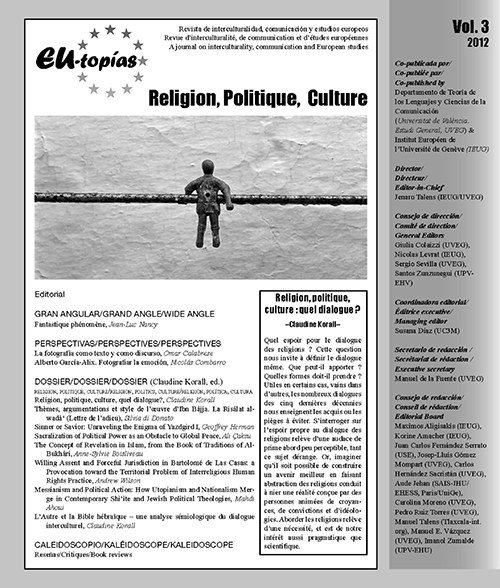Thèmes, argumentations et style de l’œuvre d’Ibn Bâjja
DOI:
https://doi.org/10.7203/eutopias.1.18491Keywords:
Ibn Bâjja (Avempace), Medieval philosophy, Arabic and Hebrew tradition Abstract
Abstract
This article focuses on the Risalat al-Wada ‘(Farewell Letter) by Avempac-e (ca1085-1139), one of the books in which the author develops his theory of intelligence transmitted in Arabic, Hebrew and Latin. The heterogeneous nature of the textual tradition is an example of the use of texts and philosophical doctrines crisscrossing linguistic cultural and religious backgrounds in the Mediterranean area in medieval times. Direct textual tradition, in Arabic, is limited and incomplete, and the indirect tradition in Hebrew acts as an essential witness in the study of the structure and the solution of many textual quandaries. From a philological approach, taking into account textual epistolary tradition addressing the historical, cultural and linguistic conjunction that characterizes it, this article examines a specific aspect of the work of Avempace: its proverbially cryptic and difficult nature. This paper analyzes the structure and stylistic aspects of the Treatise, and provides an analytic framework of the Farewell Letter and its contents taking into account its distinctive obscurity arising from the dynamics of transmission within the text itself, that is, of the author and the way he writes his texts.
 Downloads
Downloads
Downloads
Published
How to Cite
-
Abstract193
-
PDF (Français )161
Issue
Section
License
![]()
The authors conserve the copyright. All content published in EU-topías. Journal of interculturality, Communication, and European Studies are subject to the license Creative Commons Attribution-NonCommercial-ShareAlike 4.0 license. The full text of the license can be found at <http://creativecommons.org/licenses/by-nc-sa/4.0>
They may be copied, used, disseminated, transmitted and publicly displayed, provided that:
- The authorship and original source of the publication is cited (journal, publisher and URL of the work).
- They are not used for commercial purposes.
- The existence and specifications of this license of use are mentioned.
It is the responsibility of the authors to obtain the necessary permissions for images that are subject to copyright.



